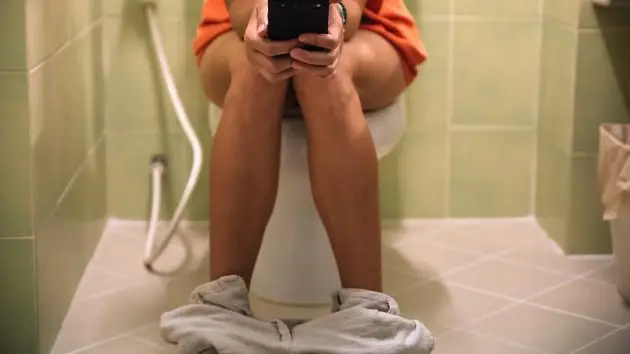- Published on
Scrolling on Your Phone on the Toilet Raises a Health Risk No One Wants to Talk About
Listen to the full article:
- Authors

- Name
- Jagadish V Gaikwad
Why Is Scrolling on Your Phone on the Toilet a Hidden Health Hazard?
In today’s digital age, spending time on your smartphone during almost any activity has become second nature — including when you’re sitting on the toilet. But recent medical research reveals a surprising and uncomfortable truth: scrolling on your phone while on the toilet can dramatically increase your risk of developing hemorrhoids, a painful and common condition no one wants to talk about.
This blog dives into the science behind this connection, explains what hemorrhoids are, why your toilet-time scrolling habit might be putting you at risk, and offers practical advice on how to enjoy your smartphone safely without compromising your health.
What Exactly Are Hemorrhoids?
To understand the risk, it helps to know what hemorrhoids are. Everyone naturally has hemorrhoids — they are vascular cushions located in the anal canal that help control stool passage. Problems arise when these blood vessels swell or become inflamed, causing symptoms like itching, pain, discomfort, and sometimes bleeding.
Hemorrhoids are one of the most prevalent gastrointestinal issues, affecting about 4.4% of the U.S. population, with over 4 million doctor visits annually and healthcare costs exceeding $800 million. Despite their prevalence, the exact causes are not fully understood but are generally linked to factors that increase pressure on the rectal veins, such as:
- Straining during bowel movements
- Prolonged sitting on the toilet
- Low-fiber diets
- Pregnancy
- Heavy lifting
What Does Research Say About Smartphone Use on the Toilet and Hemorrhoids?
A recent study published in PLOS One sheds light on the surprising connection between smartphone use on the toilet and hemorrhoid risk. Researchers surveyed 125 adults undergoing colonoscopies and assessed their smartphone habits during toilet visits along with other health factors like diet, physical activity, and straining.
Key Findings:
- Smartphone users spent significantly more time sitting on the toilet — often five times longer than non-users.
- This prolonged sitting was linked to a 46% increased risk of hemorrhoids, regardless of age, sex, body mass index, exercise habits, or fiber intake.
- The extended toilet time is likely due to the addictive nature of smartphones, which encourage endless scrolling through social media, news, or videos.
As Dr. Trisha Pasricha from Boston’s Beth Israel Deaconess Medical Center points out, excessive sitting on the toilet increases pressure on the anal cushions, which can cause or worsen hemorrhoids.
Why Does Prolonged Sitting on the Toilet Cause Hemorrhoids?
When you sit on the toilet for long stretches, the veins around your rectum and anus experience increased pressure. This pressure causes these blood vessels to swell and inflame, creating hemorrhoids. The act of straining or pushing harder to pass stool further aggravates the problem.
Smartphones make it easy to lose track of time during bathroom visits, turning what should be a quick stop into prolonged sitting sessions. This habit can become a perfect storm for developing or worsening hemorrhoids.
The Unsanitary Side of Toilet Phone Use
Beyond hemorrhoids, using your phone on the toilet raises hygiene concerns. Toilets can release aerosolized germs when flushed, which may land on your hands and any objects nearby — including your phone. Smartphones can harbor bacteria and viruses that may increase your risk of infections if not cleaned regularly.
Practical Tips to Protect Your Health Without Giving Up Your Phone
While it may be hard to resist the lure of bathroom scrolling, there are ways to enjoy your phone without putting your health at risk:
- Limit your time on the toilet: Aim to keep bathroom visits under 5 minutes. Set a timer if needed.
- Avoid using your phone while on the toilet: Bring a book or magazine instead, or simply enjoy some screen-free quiet time.
- Improve bathroom posture: Use a footstool to elevate your feet and simulate a squatting position, which helps ease bowel movements and reduces straining.
- Maintain a high-fiber diet: Eating plenty of fruits, vegetables, and whole grains supports regular, easy bowel movements.
- Stay hydrated: Drinking enough water helps prevent constipation, lowering the need to strain.
- Clean your phone regularly: Use disinfectant wipes to reduce bacteria and viruses.
- Exercise regularly: Physical activity promotes healthy digestion and circulation.
Why Changing This Habit Matters
Smartphone scrolling on the toilet might seem like harmless multitasking or a way to relax, but it’s important to be aware of its hidden risks. Hemorrhoids can cause discomfort, pain, and bleeding, often requiring medical treatment or even surgery in severe cases.
By breaking this habit, you can reduce your risk of hemorrhoids and protect your overall digestive health while still enjoying your digital content at more appropriate times.

Final Thoughts: Balancing Modern Life and Health
Smartphones are ingrained in our daily routines, often providing entertainment, connection, or distraction. However, the new evidence linking phone use on the toilet to increased hemorrhoid risk is a clear reminder that some habits deserve reconsideration.
Next time you sit down for a bathroom break, remember that limiting screen time there is a small change that can make a big difference for your health. After all, your comfort and wellbeing are worth more than a few extra TikTok videos or social media scrolls.
If you're interested in a healthier lifestyle and want to reduce risks like hemorrhoids, consider exploring products like ergonomic footstools or apps that encourage mindful phone use.
For example, the Squatty Potty on Amazon.in can help improve your toilet posture significantly.
Embrace mindful habits today and keep your bathroom breaks healthy and quick!

